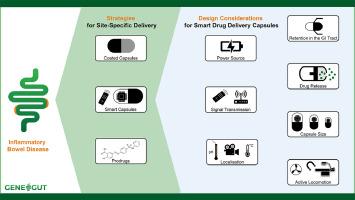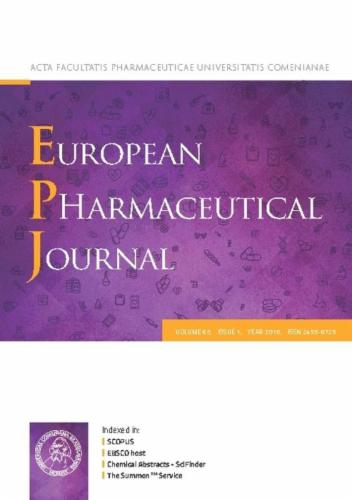用于给药的可摄入遥控智能胶囊的最新技术和未来展望:GENEGUT 综述。
IF 4.3
3区 医学
Q1 PHARMACOLOGY & PHARMACY
引用次数: 0
摘要
克罗恩病等炎症性肠病(IBD)的发病率不断上升是全球,尤其是发达国家新出现的问题。口服给药技术可以在选定的炎症部位释放活性治疗药物,这为最大限度地提高治疗效果和减少脱靶效应带来了巨大希望。近年来,IBD 的治疗策略不断扩展,生物制剂和核酸疗法日益受到重视。在胃肠道(GI)中进行可靠的特定部位给药对这些疗法尤为重要,以确保在靶细胞中有足够的浓度。可食用智能胶囊在精确给药方面具有巨大潜力。尽管之前对给药智能胶囊进行商业化的努力并不成功,但目前需求的增长以及最近在组件开发、制造和微型化方面的进步重新点燃了人们对可摄取设备的兴趣。因此,本综述分析了与可摄取式智能给药胶囊相关的各种机械和电子元件的进步。这些组件包括用于设备定位、驱动和消化道内保持、信号传输、药物释放、电源和有效载荷存储的模块。本文介绍了与以往胶囊设计功能相关的挑战和制约因素,并对未来的设计考虑因素进行了批判性展望,以确保高效、可靠的特定部位给药,用于消化道疾病的局部治疗。本文章由计算机程序翻译,如有差异,请以英文原文为准。

State-of-the-art and future perspectives in ingestible remotely controlled smart capsules for drug delivery: A GENEGUT review
An emerging concern globally, particularly in developed countries, is the rising prevalence of Inflammatory Bowel Disease (IBD), such as Crohn's disease. Oral delivery technologies that can release the active therapeutic cargo specifically at selected sites of inflammation offer great promise to maximise treatment outcomes and minimise off-target effects. Therapeutic strategies for IBD have expanded in recent years, with an increasing focus on biologic and nucleic acid-based therapies. Reliable site-specific delivery in the gastrointestinal (GI) tract is particularly crucial for these therapeutics to ensure sufficient concentrations in the targeted cells. Ingestible smart capsules hold great potential for precise drug delivery. Despite previous unsuccessful endeavours to commercialise drug delivery smart capsules, the current rise in demand and recent advancements in component development, manufacturing, and miniaturisation have reignited interest in ingestible devices. Consequently, this review analyses the advancements in various mechanical and electrical components associated with ingestible smart drug delivery capsules. These components include modules for device localisation, actuation and retention within the GI tract, signal transmission, drug release, power supply, and payload storage. Challenges and constraints associated with previous capsule design functionality are presented, followed by a critical outlook on future design considerations to ensure efficient and reliable site-specific delivery for the local treatment of GI disorders.
求助全文
通过发布文献求助,成功后即可免费获取论文全文。
去求助
来源期刊
CiteScore
9.60
自引率
2.20%
发文量
248
审稿时长
50 days
期刊介绍:
The journal publishes research articles, review articles and scientific commentaries on all aspects of the pharmaceutical sciences with emphasis on conceptual novelty and scientific quality. The Editors welcome articles in this multidisciplinary field, with a focus on topics relevant for drug discovery and development.
More specifically, the Journal publishes reports on medicinal chemistry, pharmacology, drug absorption and metabolism, pharmacokinetics and pharmacodynamics, pharmaceutical and biomedical analysis, drug delivery (including gene delivery), drug targeting, pharmaceutical technology, pharmaceutical biotechnology and clinical drug evaluation. The journal will typically not give priority to manuscripts focusing primarily on organic synthesis, natural products, adaptation of analytical approaches, or discussions pertaining to drug policy making.
Scientific commentaries and review articles are generally by invitation only or by consent of the Editors. Proceedings of scientific meetings may be published as special issues or supplements to the Journal.

 求助内容:
求助内容: 应助结果提醒方式:
应助结果提醒方式:


